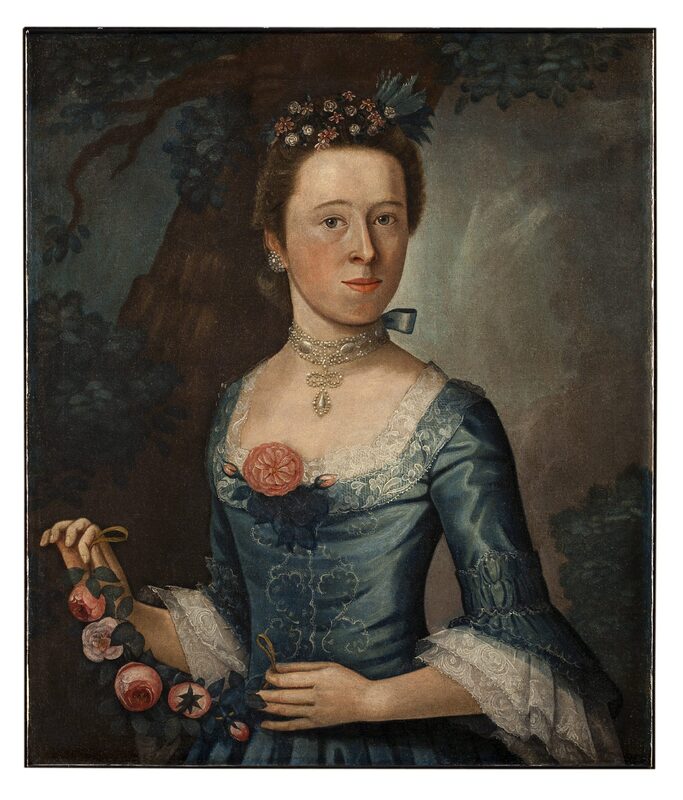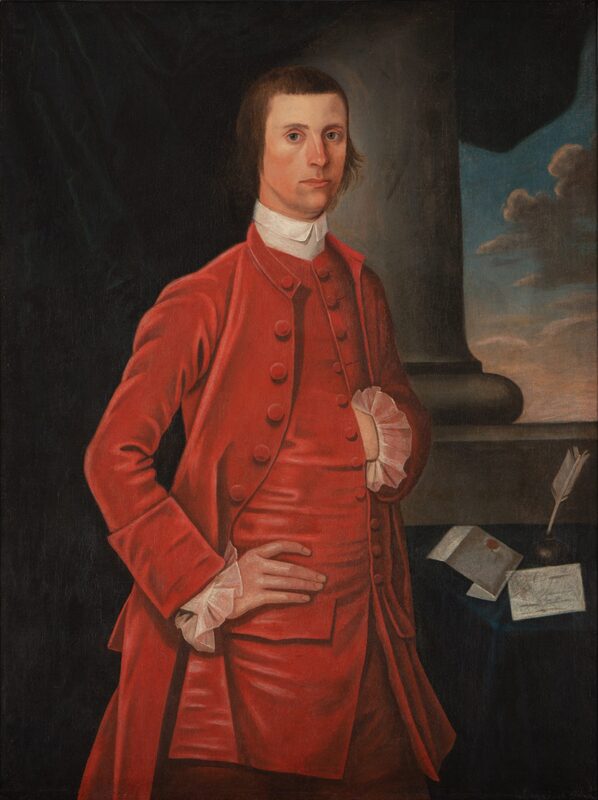The Gentlemen
“Upon the whole, it may be questioned whether history, ancient or modern, can furnish an instance of such wanton cruelty. Herod gave a reason for destroying the children of Bethlehem, Nero was known to have power over life and death, and Judas was rewarded with thirty pieces of silver; but here was no pretense to reason, authority, or interest, for every point had been given up.” -Anonymous[1]
“The Gentlemen” or Norfolk’s elite found themselves divided along political, local, and economic lines at the time of the Norfolk Riots. These divisions can best be summarized as a conflict between Patriots and Loyalists, locals and immigrants, and merchants and law enforcement. As much as the Norfolk Riots were about inoculation, they served as a vehicle through which the Gentlemen could settle their personal vendettas.
Did the Gentlemen care about public health in Norfolk?
Borough sergeant Joseph Calvert, magistrates Paul Loyal, Maximilian Calvert, and Thomas Newton, and clerk Samuel Boush were all opposed to Dr. Dalgleish’s inoculation attempts in 1768.[2] As was Dr. James Taylor, Dr. Dalgleish’s rival, and Taylor’s business partner, Dr. John Ramsay.[3] These men claimed to be concerned for the community’s health, but many embraced inoculation in a way that contradicts their actions and arguments during the Norfolk Riots.
Maximilian Calvert, the brother of Cornelius Calvert, had his family moved to a house some distance from Norfolk during a serious outbreak of smallpox in 1751.[4] This was the very same house that Dr. Dalgleish later attempted to rent in order to inoculate the families of Dr. Campbell, Cornelius Calvert, James Archdeacon, James Parker, Lewis Hansford, and Neil Jamieson.[5] Dr. Dalgleish failed, however, after people threatened the property owner on grounds that the location was not secure. If Maximilian Calvert used this home to protect his family from an infected town, why would he or his allies consider it incapable of safeguarding a town from inoculated families?
The Gentlemen George Abyvon and Samuel Boush had their own family members inoculated before the Norfolk Riots ever took place.[6] Samuel Boush in particular paid for his children to be inoculated near Baltimore, Maryland.[7] One might assume Boush sent them so far and spent so much to ensure the procedure was done safely. However, Boush’s children were inoculated just one mile from Baltimore.[8] This is closer to Baltimore than Dr. Campbell’s plantation was to Norfolk. If the pro-inoculators of Norfolk endangered the town, Boush endangered Baltimore. Yet no armed mob appeared to corral his children into a local Pest House.
Dr. James Taylor deserves to be scrutinized as well. As mentioned above, he was Dr. Dalgleish’s business rival. He had every reason to denounce Dr. Dalgleish and his practices. Cornelius Calvert even accused Dr. Taylor of accepting money from Maximilian Calvert, Thomas Newton, and others to do just that.[9] Though the accusation was never verified, it is true that Dr. Taylor later traveled to Baltimore to study inoculation.[10] This suggests his criticism was not inspired by Dr. Dalgleish’s medical practices, but by Dr. Dalgleish himself.
The pretense of defending the public’s health seems to have superseded any actual concern for the Norfolk community. Some of the pro-inoculator’s loudest critics had inoculated their own families. Even if one were to accept their defense, which is that they were not fundamentally opposed to inoculation but merely enforcing safer guidelines,[11] they still stand as hypocrites. Gentlemen like Samuel Boush failed to abide by the very regulations they imposed during the Norfolk Riots. Their actions make more sense when one considers other potentially political and economic motivations.
Patriots versus Loyalists
It’s widely accepted that Norfolk’s pro-inoculation Gentlemen tended to be Loyalists; they were people who believed in Britain’s right to rule over the colonies.[12] Meanwhile, their anti-inoculator adversaries were largely Patriots who believed in colonial America’s right to self-determination. It is entirely possible that the Gentlemen Patriots aligned themselves with the general public for no other reason than to sic a mob on the Loyalist elite. It was Joseph Calvert who roused the mob during the first riot, after all.
Patriots like Thomson Mason boldly argued that English laws did not apply to the colonies,[13] so why should the legality of inoculation under the British Empire matter? Why should the people of Norfolk bend to the whims of Loyalists when the inoculation was a local concern with local dangers attached? By declaring themselves as an ally to the people of Norfolk, Patriot Gentlemen gained influence over them. In this context the riots are a clash between Norfolk Patriots and Loyalists.
Locals versus Immigrants
The pro- and anti-inoculators were not merely divided along Patriot or Loyalist lines, but native and immigrant identities. Pro-inoculators James Parker, William Aitchison, and Archibald Campbell were all Scottish while Lewis Hansford was English-born.[14] By contrast, many of the Patriots were locals. Immigrants whose citizenship and protections were guaranteed by the British Empire would have very little reason to reject its authority. In fact, their presence reinforced that authority by reminding locals they were subject to the same laws as someone born an ocean away. Rebelling against these Loyalist foreigners with a local mob was an indirect rebellion against the Empire. The local community asserted its own power, however insignificant it might seem, with the blessing of local leaders.
Many of the anti-inoculators were local authorities in Norfolk. Joseph Calvert was a sergeant. Paul Loyal, Maximilian Calvert, and Thomas Newton were magistrates, and Samuel Boush was a clerk. In theory they were bound to enforce imperial law. By refusing to do so during the Norfolk Riots, they eroded imperial authority in favor of local rule. This is a powerful message of resistance from local Patriots, especially because many of the cases brought against anti-inoculators ruled in their favor. In fact, one might consider this Norfolk’s turning point. Norfolk was a key supplier for the Continental Army during the Revolutionary war, and here we see the sentiments of locals fall in line with Patriot Gentlemen who belong to the same class and intellectual group as the Founding Father.
Merchants versus Local Law Enforcement
The bond between natives and immigrants in Norfolk was further strained by money relations. Many of the foreign-born Loyalists were also merchants and creditors.[15] Thus, many of the local Patriots owed them money. As Patriot sentiments rose, these merchants and creditors became increasingly concerned that local magistrates would delay debt-collection.[16] Perhaps they were right to worry.
The Norfolk Riots whittled imperial authority. This is why James Parker’s best attempts to repeal his case in England failed. He was stuck with the conviction that he was a “public nuisance” for inoculating his family. It is also why he left the colonies with many Loyalist merchants and creditors in 1776.[17] There was little chance that foreign-born merchants could collect their debts from people who rejected imperial authority and had the backing of local officials. In turning a mob against these people, the anti-inoculation Gentlemen would have freed themselves from some debt while strengthening their own position as local authority figures.
It is possible that Gentlemen associated with Norfolk’s mob opposed inoculation out of genuine concern for the public’s health. It is more likely that they took advantage of a tense situation and fueled the mob’s dissent in order to disempower Loyalists, immigrants, and creditors. The inherent nativism of their politics and their apparent hypocrisy when it comes to inoculation indicates that anti-inoculators clashed with pro-inoculators for reasons outside of inoculation. As a whole the Patriot, native-born elite certainly came out stronger politically, economically, and socially by the time of the Revolutionary War.
Footnotes
[1] The Virginia Gazette Supplement (Rind, VA), Aug. 25, 1768.
[2] Thomas Costa, “Economic Development and Political Authority: Norfolk, Virginia Economic Development and Political Authority: Norfolk, Virginia Merchant-Magistrates, 1736-1800 .” Dissertations, Theses, and Master Projects (1991): 156.
[3] Costa, “Economic Development and Political Authority,” 156.
[4] The Virginia Gazette Supplement (Rind, VA), Aug. 25, 1768.
[5] The Virginia Gazette Supplement (Rind, VA), Aug. 25, 1768.
[6] The Virginia Gazette Supplement (Rind, VA), Aug. 25, 1768.
[7] The Virginia Gazette Supplement (Rind, VA), Aug. 25, 1768.
[8] The Virginia Gazette Supplement (Rind, VA), Aug. 25, 1768.
[9] The Virginia Gazette Supplement (Rind, VA), Aug. 25, 1768.
[10] Patrick Henderson, "Smallpox and Patriotism: The Norfolk Riots, 1768-1769." The Virginia Magazine of History and Biography 73, no. 4 (1965): 422-423.
[11] The Virginia Gazette Postscript (Purdie and Dixon, VA), September 8, 1768.
[12] Patrick Henderson, "Smallpox and Patriotism: The Norfolk Riots, 1768-1769." The Virginia Magazine of History and Biography 73, no. 4 (1965): 414.
[13] Kathy McGill, “A Meteor and a Generous Mind: The Revolutionary Political Thought of Thomson Mason.” Virginia Magazine of History & Biography 125 (2): 123.
[14] Costa, “Economic Development and Political Authority: Norfolk, Virginia Economic Development and Political Authority: Norfolk, Virginia Merchant-Magistrates, 1736-1800 .” Dissertations, Theses, and Master Projects (1991): 160.
[15] Costa, Economic Development, 7.
[16] Costa, Economic Development, 7.
[17] Costa, Economic Development, 7.

